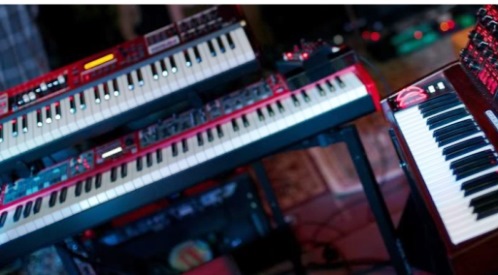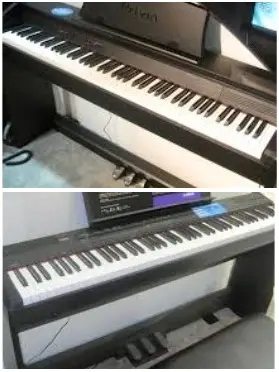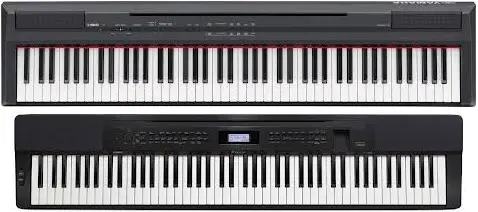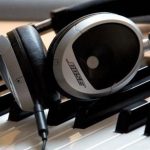
 Yamaha vs Casio keyboards: Find a comparison between these two major brands of their product lineup and important features, to help you buy one. When it comes to keyboard instruments, Yamaha and Casio are two very trusted brands and their products are quite popular among students as well as performers. In recent years, Casio has introduced several new top-quality models to please the experienced musicians.
Yamaha vs Casio keyboards: Find a comparison between these two major brands of their product lineup and important features, to help you buy one. When it comes to keyboard instruments, Yamaha and Casio are two very trusted brands and their products are quite popular among students as well as performers. In recent years, Casio has introduced several new top-quality models to please the experienced musicians.
Yamaha vs Casio – Keyboard & Pianos
If you are looking out for a digital keyboard or piano, it is very likely that you would have considered these two brands – Yamaha Keyboards & Casio Keyboards
Both have a wide range of digital music products and can provide you with some value-for-money options, especially Casio. But at the same time, it can really get confusing for you to decide, especially when you have not got the opportunity to see and hear the product for yourself.
That is the reason I have tried to make a comparison between these two brands – on some of the important features of Keyboards & Pianos.
So here we go! A comparison on some of the important parameters which you would normally use to make an informed buying decision!
| Product Comparison | |
|---|---|
| Portable Arranger Keyboards (61, 76, 88 Keys) | Casio LK Lighted Keys, Yamaha EZ Lighted Keys Casio CTK 61-Keys, Yamaha PSR 61-Keys Casio WK 76-Keys, Yamaha DGX 76-Keys, Yamaha YPG 76-Keys |
| Portable Digital Pianos | Casio Privia PX Pianos, Casio CGP Compact Pianos Yamaha P series pianos, Yamaha CP series Pianos |
| Upright Digital Pianos | Casio Celviano AP Pianos, Yamaha Arius YDP Pianos |
| Synthesizers | Casio XW Synths, Yamaha Synthesizer Keyboards |
| Keyboard Accessories | Casio Keyboard Accessories, Yamaha Keyboard Accessories |
| Player Pianos | Yamaha |
| Acoustic Pianos | Yamaha |
| Music Production Equipment | Yamaha |
Who Likes What?
Over the years, it was Yamaha all the way for experienced players and Casio for the beginners. Though the scenario is changing a bit, as you can see from the product offerings from these, Yamaha still has that advantage in terms of quality offerings.
If you are a pro keyboardist, a weathered stage musician or a performing pianist, your ears and fingers are going to be highly sensitive. Your ears will obviously demand the best sounds and the best acoustic piano reproduction, and your fingers will demand a responsive keyboard and true ivory and ebony feel (if you are a pianist) in the keyboard performance.
And Yamaha, because they offer some top class pianos as well as synthesizers, are the favored brand with most pro musicians.
But then with Casio launching a range of value-for-money products, the pros are keeping their eyes open to pick up good bargains, especially as their add-on keyboards. Beginners, no doubt, are happy to get the latest Casio products because of the price and feature ratio.
For Stage Performances
Most stage performers own multiple keyboards. And that is because, over their years of experience, they have realized that for certain gigs, it just doesn’t make sense to carry the heavier board, along with amplifiers.
A nice lightweight piano keyboard, with powerful built-in speakers can suffice in certain situations.
But why not use your best gear for all situations? Well. There could be various reasons.
Here are a few:
If you are playing at a venue where you have a decent amount of crowd, talking over cocktails, not everybody will realize that you are not using the best keyboard instrument. If you think, a Casio keyboard sounds tinny (that that all of them sound tinny), it may not sound like that as you get further away from the piano.
In fact, some of them may not even hear you 15 feet away from where you are, if they’re really engrossed in some important discussion (sorry to burst your ego bubble but that is a fact).
So a seemingly average keyboard may do just about fine in such situations.
Volume & Output
For some of the situations mentioned above, a keyboard with good built-in speakers can be handy, and that is where some of the Casio keyboards are good.
Again, this is not a hard-and-fast rule but it works fine in most situations, especially smaller venues. And the best part is that you don’t need additional speakers or amplifiers.
But then if you are willing to carry an additional speaker, the digital piano-keyboard that you choose doesn’t necessarily need to have great built-in speakers.
You can buy a small portable powered speaker with onboard bass/treble controls. That way you don’t even have to depend on any PA system, and the external speaker itself will be able to provide plenty of volume.
In case, you don’t even want to do that, another option is to just plug the AUX OUT of your digital keyboard to a PA, and you’ll still be hearing the piano and other voices/styles from your keyboard in a smaller venue.
In case, if you just want something to hear your keyboard, and will be using a good PA or external amps, then you may even use good monitor earphones to hear yourself play.
Brand Name
This is where Yamaha scores! The reason being Yamaha has a lot of products at the higher price range.
Be it the more expensive digital pianos – which looks and feels much better, or their range of professional keyboard synthesizers and arrangers…Casio does not have the products which can impress a lot of professionals (at least for now).
Ever seen somebody performing on-stage, for a big event, with a Casio keyboard or a piano?
That is where Yamaha as a brand outscores Casio.
Having said that, Casio has taken their products a notch up. They have been constantly upgrading their products and launching newer models, be it in the arranger series or the digital pianos. Their portable digital pianos are already garnering lot of good reviews, so do check them out.
Value for Money
What does it mean? It means which brand gives you the most bang for your buck!
And the answer is obviously Casio!
If you take any digital piano or keyboard from Casio…for the given amount of money that you spend, you will always get a lot more features.
Read more on Best portable keyboard for beginners & hobbyists for around 200 Dollars

Sound and Feel
As mentioned above, Casio hardly has anything in the $1000 plus price range aimed at pros and semi-pros. So Yamaha is a winner there!
But below that price range, the keyboard feel and sound is very subjective and can vary from person to person. You may find that some of the Casio products sound and feel equally better.
For beginner keyboards, the sound quality is a bit better in Yamaha, but then you pay more. So it is up to you to decide if you want to pay more, when it is going to take a couple of years for you to learn and to play well.
Note: By the way, you may hook up your Casio to decent external speakers or to your existing music system (if it a better one), and see that the sound output is much better than the speakers on most of the arranger keyboards.
Range of Piano Keyboards
Yamaha definitely scores over Casio here as it has high end products like synthesizers, workstations and music recording equipment including studio monitors and PA systems. Casio has a few keyboards in WK and CTK series for the advanced users but then they are still not in competition with the likes of Motif and Fantom.
Yamaha also had the edge over Casio in digital pianos for a long time until recently where Casio has introduced some great digital pianos, especially their Privia Pianos. In the mid-range of portable pianos the Privia pianos are doing quite well, along with the Yamaha pianos.
What to Choose?
What you choose will depend on your requirements.
The more experienced players may choose a better feeling-and-sounding instrument, and don’t mind spending more for it. Some of them may choose to go in for a better instrument, not necessarily a louder instrument, and think about the amplification aspect later on.
But for most beginners and intermediate players, the prospect of getting a piano / keyboard with more features at an affordable cost is tempting.
Final Thoughts
A fact is that Yamaha has a better brand image and significantly outsells Casio – specially keyboards & synths. If you plan to use your keyboard / piano for professional use – say onstage or in a studio, and have a budget of above $1000, you may have to consider Yamaha vs. Roland or a Korg.
For other purposes, a Casio could be just as fine. Casio always offers better specifications and gives you more value for your money. It is even coming out with an aggressive line of products lately in the below $1000 price range, and there is hardly any difference in quality there. I would definitely recommend a Casio for people who are cost conscious.
 |
 |
Related Posts
- Checkout Casio keyboards here
- Checkout Yamaha keyboards here
- More on arranger keyboards here
- All Pianos, Keyboards & Synths
Question: Casio Keyboard vs. Yamaha Keyboard
Let us know your comments on the Yamaha vs. casio piano keyboard debate, and let us know what you like or dislike about each of these brands, their products and their services. Here are some points that you may comment on:
Which Brand do you like?
What would you use for Stage Performance?
Does built-in speakers and its Volume matter to you?
Which on gives the best Value for Money?
How about the Sound and Feel?
Which has a better range of Piano Keyboards
Which provides better Customer Support
Any other related point
– Ben (Dubai)
Answers:
I agree that Casio does not make as many high end models as yamaha does, and the quality of the sound produced differs, but the fact is that for beginners to intermediate level players, Casio has many inexpensive models with almost all the features that you can find on music keyboards. For someone who is starting out, or who wants to play just for fun, I would still recommend Casio. – Anonymous
This is something which even I am trying to figure out…to go in for a Yamaha keyboard or a Casio keyboard. Looking at the budget I am tempted to go in for a Casio keyboard, but I don’t know, somehow I have heard so many people saying things like “Casio is a cheap brand” that I am unable to decide. I will be learning to play keyboards and so I wanted something that had lots of sounds, effects, lessons, accompaniments, ability to connect to computer, etc. but did not want to pay a lot as of now…and Casio keyboard did seem to fit the bill. Yamaha seemed a bit expensive on the other hand, so as of now I am caught in this Casio vs. Yamaha keyboard thing. Any suggestions will be highly appreciated. – Keith
I have been playing for more than 15 years now and I have taught a lot of students as well. I think if someone is just starting out, learning to play the keyboards then Casio can be a good keyboard to start on. For a decent price, you can get a 61 key Casio keyboard with so many features? including built-in music lessons. I would say you rather spend the time learning to play the keyboard and getting used to the various functions that music keyboards have. In a couple of years if you think you have really progressed well as a player, then you are free to choose a music keyboard of your choice. Sell off you Casio and buy a top of the range keyboard at that time. Until then, it really does not matter as long as the keyboard that you buy is within your budget. I have observed that the sound quality on entry level Yamaha keyboards and pianos tend to be better than those on Casio, but then they cost more as well. On the other hand Casio, in general, offers more features than Yamaha for a given price range. – Suresh
My son plays keyboards. We initially bought him a Casio mini keyboard and the thinking was just to introduce him to music. Over a period of two years, he has picked up quite well and is now able to play many songs. Seeing his growth, we recently bought him a Yamaha PSR e413. I myself don’t play the keyboards but I was quite impressed with its looks and its sound, compared to the other models that we saw. I personally wanted him to have a keyboard with most of the features, including the ability to connect to a computer (though I have no clue how to connect a keyboard to computer and neither do I know its purpose) He seems to be quite happy with the yamaha PSR-e413 keyboard and has recently started using various chords with his songs. – Wasim
Though I think there is one misperception about this comparison, if I may. I have been teaching music keyboards for 24 years now. My experience has been that Casio keyboards have very different sound qualities depending on the models within their range?just like any other brand. To say that the sound of all Casio keyboards are not as good as Yamaha keyboards sound quality is very incorrect. An entry level PSR223 Yamaha cannot match the superior sound quality of a WK500 Casio for instance, which is in a high price bracket. Additionally, sound volume and quality is not only about the samples but also about the quality of the amplifiers and speaker quality and size. Buyers should at least be aware of the size of the speakers shown in the specs. There are many Casio keyboards that are superior in sound quality and sound volume to Yamaha because of price differences and vice versa too. – Mike from SA
Casio and Yamaha are among the best keyboards on the market. I’ve been playing on Casio since I was 3 years old and I’ve been listening to music for a long time. I played on Yamaha several times and according to me this keyboard doesn’t give me a good piano sound. Right now I’m using Casio WK-1630, and compared to Yamaha PSRs and MOTIFs, it gives a better piano sound. Casio is not only made for beginners, but is also used by well-known artists such as Jean-Michel Jarre and by professional musicians and producers. Take for example the brand-new CASIO WK-7500 released in 2011. It has so many incredible sounds and sliders to control Hammond organs! So listen and try to play on those two (CASIO/YAMAHA) before saying Casio’s just made for beginners. – Luidgy Makx
When I relocated to a new city, I wanted a good keyboard so that I could practice, and sell it off when I moved back. I did not want to spend a lot, but wanted most of the features; not exactly an entry level 61 key keyboard. So I went in for a Casio ctk 6000. I was happy with it initially, considering its features and the price as well, but after some time I could feel that the quality of the sound was very uninspiring. I had a Yamaha PSR 423 back home and it sounded far better. I personally think if you know how to play keyboards, and have owned a Yamaha before, it is difficult to play on a Casio keyboard. I am using Yamaha piano keyboards for ten years now. I am in agreement that many professional musicians, especially for One Man Band situations, are using Yamaha keyboards. I think Yamaha Keyboards are really the best, especially if you are looking for a professional keyboard. At the lower-end of the music keyboard spectrum, Casio may compete with Yamaha for the entry level keyboards and there could be people who prefer Casio…but that would be very few in number and that too there basis of buying would only be cost. Yamaha clearly stands out in terms of the sound quality, superior styles and voices, range of keyboard models to choose from, and the Yamaha’s education suite is also very comprehensive. The features really get sophisticated as you go up higher in the chain. – Uber
The Truth: Casio does have higher end models like the Casio Privia-350, the Privia-330, the Privia 150, and even the Casio CDP models. The Privia 350 and 330 have depthness, warmth, and beautiful sounds. It is affordable ($700) and it sounds just like an acoustic grand piano. The keys are heavy and gives you quality sound, especially for the price.The Yamaha entry levels keyboards are much better than the Casio entry level keyboards and are the exact same price ($99-$189). Now, Yamaha does have higher ends like the Motif, etc. The Motif & MM08 all sound good!!!! They are nothing but $100-1000 extra from the Privia.
Conclusion: If you want to go professional, heavy keys, good sound quality including different instruments, recording in a studio, and touring: I suggest you stick with your budget and go for the casio privia models, casio cdp models, or the yamaha motif & mm08 models! The choice is yours!!! If it sounds good to you then buy it!!! if you can afford it and if you really want it; then get it! no matter what; trust and believe that Jesus will help you to make the best decision. Every body’s opinion are different so it all about how you feel at the end of the day. let no one pressure you into buying a Yamaha or Casio! Be blessed because the Casio and Yamaha both have great models. but in my opinion, the Yamaha has a better line of entry level keyboards and professional digital pianos. Casio to me just has a better line of professional digital pianos. be encouraged! 🙂 – Believer

Have you used these brands before? Let us know your comments on the Yamaha vs. casio piano keyboard debate, and let us know what you like or dislike about each of these brands, their products and their services.
KeytarHQ editorial team includes musicians who write and review products for pianists, keyboardists, guitarists & other musicians. KeytarHQ is the best online resource for information on keyboards, pianos, synths, keytars, guitars and music gear for musicians of all abilities, ages and interests.



I’m a guitar player, that always wanted to learn piano. In the 1980’s my family gave me a Casio CT7000 61 Key keyboard. It had several different sounds, also could play chords by depressing one key. After fooling around on my own for a while, I realized I needed to take some piano lessons. My lessons were on a acoustic piano, which came as a shock, being now I weighted keys, and 88 of them, but sounded great! Though I loved the acoustic piano, the 80’s music scene was very heavy with Synth Sounds. These came from the Yamaha DX7, Korg M1, Roland Juno, etc. I wanted to make these Synth sounds too, but also wanted a great piano sound (patch). Being I couldn’t afford a Yamaha DX, or Korg, I ended up buying a Ensoniq ESQ-1 (no longer in business). I also purchased a Roland JC-120 Amp. In the 80’s the JC had Line inputs in the rear. I could use this amp with my ESQ-1 with Stero Outputs, as well as having a great guitar amp. The ESQ-1 had touch & velocity sensitivity, but no weighted keys. I still say it today, that ESQ Piano Patch was the best I’ve heard, other than a really high end Yamaha in the $5K range. After years of use, I decided I really needed 88 Keys, and weighted ones at that. I sold the Ensoniq (PS…Electronic Keyboards are like Personal Computers. Spend $3,000 today, 3 years from that point it’s worth $300 if your lucky. Keep that in mind when you buy something electronic, TV’s, Whatever…) I then purchased an Alesis QS8.1. So now I had 88 Keys, weighted and a fairly decent Piano Synth. I also bought a Ensoniq ZR-76 Synth just prior to them going out of business. There were certain patches Ensoniq had that I wanted, that was my reasoning with that. Having the Synth covered at some point I wanted a Better Electric Piano, sold the Alesis, and I picked up a Yamaha P80. 88 Keys feel great, and with head phones, Piano sounds are terrific. I had sold the JC120 to buy a Fender Deluxe Reverb Amp (Strictly for Guitar) and wanted to buy a Keyboard Amp. I ended up with a Roland KC150. I plugged the Yamaha in, and it sounds like crap, tinny…simply awful. I strictly use the Yamaha with haedphones, but would like to play without them as well. After years of this, here I am again looking at Keyboards again. I just may end up full circle, that is back to Casio. This new Priva Series sounds great on the reviews I’ve seen on Youtube. I’m going to have to check it out at a local music store see if they sound just as good. Until I have the money, room, and a sound proof room at that, for a acoustic, my affordable electric piano search will continue.